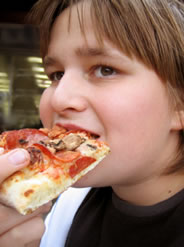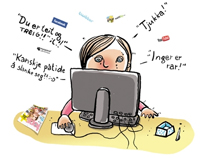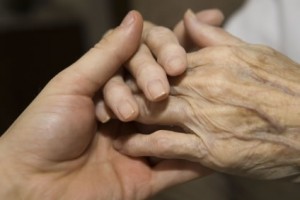Published: December 31, 2010

© istockphoto
Bad eating habits, ingestion of alcohol, sedentary lifestyles – all unhealthy life habits that are already being detected in early adolescence and that are especially predominant amongst women and young people between the ages of 19 and 26. The prevention campaigns should take very much into consideration these groups at risk and even take into account those less than 13 years. These are some of the conclusions that can be drawn from the PhD thesis presented at the University of the Basque Country (UPV/EHU) by researcher Marta Arrue, with the title, Lifestyle habits and psychological factors in adolescence and youth in the Autonomous Community of the Basque Country (CAV-EAE).
Ms Arrue studied 2,018 young people from the CAV-EAE who were asked to fill in various questionnaires. With the gathered data, she collated and analysed habits of life according to sex and age (adolescents from 13 to 17; young persons from 18 to 26).
[continue reading…]
Published: December 30, 2010

Illustration on digital bullying by Annlaug Auestad
Two out of three children have experienced bullying via the Internet or mobile phones according to a survey made by Telenor in 2008 in Norway. The survey also shows that parents are uncertain about what to do about this kind of bullying.
1. Take bullying through social media seriously
2. Talk with children and young people about Internet use and netiquette
3. Get involved in the children’s Internet use and become friends with your children on Facebook
4. Remember to save harassment and threats on the hard disc and mobile device
5. Contact the police on suspicion of offenses
For many victims of bullying cyber-bullying is just one of several ways in which they are being harassed. This may mean that they never have any protected place. At school, they are left out or maligned and when they come home they receive insults on mobile phones and net. Access to social media in recent years has unfortunately provided some new bullying tools,”
Tove Flack
Research Fellow Tove Flack at the Centre for Behavioural Research (SAF) at the University of Stavanger has extensive experience in counselling work in anti-bullying, which includes the centre’s program zero, where zero tolerance for bullying and active involvement are important concepts. Zero gives schools advice on how to prevent, detect and solve problems and create continuity. She has also worked with cases of bullying and conducted bullying research in schools. In her research and practice, she has particularly focused on hidden bullying. Curious? Continue reading
Published: December 29, 2010

People train for marathons, hikes and bike rides. But can you train to withstand the challenges of elder care?
A series of new studies and reports on the emotional, physical and financial challenges of caring for aged or disabled loved ones suggest it might be a good idea. The nearly 1 in 5 Americans who provide elder care face a sharply higher-than-average risk of dying themselves, research shows. And nearly half of U.S. workers say they expect to be providing elder care at some time during the next five years, the Families and Work Institute reports. (This recent SmartMoney piece highlights some of the hidden financial costs of caregiving.)
Curious? Continue reading
Source:The Wall Street Journal
Published: December 28, 2010
I have to admit with my birthday fast approaching this release caught my attention. And guess what it reminded me of? My old dad. He passed away a few years ago now sadly, but one thing he reveled in was when someone told him that he looked far too young to have grown up sons who were 20+ something. He loved it!
Oh I do miss him .
Age is not a particularly interesting subject. Anyone can get old. All you have to do is live long enough.
Groucho Marx
So then age is just a number?: “Believe you’re younger and your health will follow”….. I won’t go there just now…. not with that birthday tornado bearing down on me faster than you can say head for cover! For those of you observing “live” my unravelling with syntax … shed a tear. ( I’m morphing the website don’t you know) 😉
So maybe age really is just a number. But how young or old someone feels has a huge influence on their health and just how other people may view them. An article published in Perspectives on Psychological Science, a journal of the Association for Psychological Science, reviews the research and suggests that feeling young can actually make you look young—and have the health of a younger person, too. Curious? Continue reading



